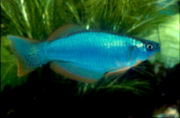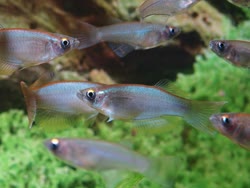|
|
Jouke Vdz (2022):
P. simlilis has the pelvic fin inserted almost below the pectoral fin. Jouke Vdz (2019): "The problem with P. similis is that we don't know what it looks like. The types (from Douala) were dried out in the past, so impossible to compare them with phenotypes we know. Seems that the area around Douala is polluted. No new records of P. similis from here. North, east and south of Douala different phenotypes occur, but which one is the real P. similis? The type locality was outside Douala, but is know in the city. Maybe it is still present in the red oval below?" 
|

















